The general population really doesn’t understand digital technology. And it’s costing them money.
 This was brought home to me last weekend while helping a friend choose a new TV. In the local shop, I noticed a variety of HDMI cables for sale. Now HDMI, for those of you not familiar with it, is quite a nice standard. It provides digital video and digital audio down a single compact and convenient connection. Much neater than the bulky DVI, VGA, SCART etc which preceded it.
This was brought home to me last weekend while helping a friend choose a new TV. In the local shop, I noticed a variety of HDMI cables for sale. Now HDMI, for those of you not familiar with it, is quite a nice standard. It provides digital video and digital audio down a single compact and convenient connection. Much neater than the bulky DVI, VGA, SCART etc which preceded it.
However, notice that it’s a digital standard. This means that, subject to major failures, what goes in at one end ought to come out at the other. Why, then, does the store sell a variety of cables of different qualities and prices? In the days of analog connections, there was something to be said for low-impedance connections and for careful screening. Who knows, those articles in the hi-fi press extolling the virtues of gold plugs and low-oxygen copper cables might even have had something to them.
But in the digital world, if you put ones and zeros in one end of a cable and don’t get something recognisable as ones and zeros at the other, you don’t get a slightly worse picture or sound. You get complete breakdown, and major image or sound corruption. A cable which does that should not be sold at a cheaper price; it shouldn’t be sold at all. Better-quality cabling will allow things to work over greater distances, but for the average user with a DVD player under his TV, it will make no difference at all.
For example, my (quite expensive) CD player is connected to my (quite expensive) amplifier through a digital COAX connection. I use a single phono-phono cable I bought for about $1 in a Radio Shack sale. And the sound is perfect.
So I asked the nice man in the shop about the fact that they sold a modest-length HDMI cable for over £100 just beside the one for £15 (which, incidentally, probably costs less than a dollar to make).
“Oh yes”, he said, “it does have an effect. We had a customer do a side-by-side test just recently and he could see a difference. He bought the more expensive cable.”
“But how?”, I asked. “It’s ones and zeros! You don’t get better quality ones or nicer-shaped zeros by paying more! How could there be a difference?”
“Well, the customer said there was one. I don’t really understand the science behind how it all works…”
The customer is always right, you see. Even when science is against him.
And now back to my copy of Richard Dawkins…
Followup: Gizmodo did some tests and agreed with my assertion. It makes no difference whether you have cheap leads or expensive ones for short distances. It can be worth paying the extra if your cable is more than 50ft long.
Recent Comments